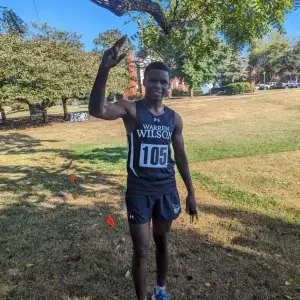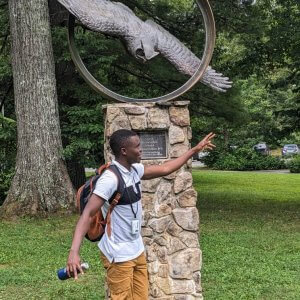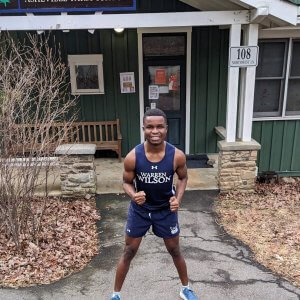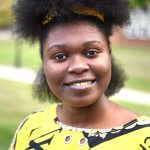REFLECTIONS FROM A GRACE SCHOLAR: HULLIBUTTON CHINYAMA
Tell us about your decision to study outside of your home country.
I grew up in a humble community where families with relatives abroad were considered wealthy and respected. Despite facing obstacles such as attending remote schools for my primary and secondary education, walking long distances barefoot, and my parents struggling to pay my school fees, I persevered in the face of adversity with the dream of making a difference abroad and bringing dignity to my family.

After completing my ordinary level of education, I aspired to enroll in a school offering sciences for advanced level studies. However, financial constraints prevented me from pursuing my path. In a bold and difficult decision, l joined the Zimbabwe National Army, hoping for sponsorship to continue my education to fulfill my dream. This sacrifice meant putting my body on the line for the sake of education.
During the army recruitment process, I developed a lymphoma tumor on my groin, leading to my removal from the barracks for an operation. While recovering in the hospital, l came across an application for the organization called Education Matters, which operates USAP Community School. Encouraged by my sister, l applied for the opportunity, and to my surprise, l was admitted.
Discovering that the USAP program offers quality education, guidance and opportunities to study abroad, l saw my dream materializing and resolved to seize the opportunity with both hands. In summary, here l am, living abroad and fulfilling the dream I once thought was out of reach.
Was it difficult transitioning to a different culture?
Upon stepping into the United States of America, I felt like l was on my honeymoon, thrilled to be in my dreamland. However, after the first week of international students’ orientation things took an unexpected turn. The jetlag, resulting from the time difference between Zimbabwe and the USA, left me struggling with my sleep cycle for many days.
As I navigated campus life, l found it peculiar that people would smile at me and pass by without further interaction or a simple greeting would leave the other person already fifty meters away by the time l responded. This cultural difference initially puzzled me.
Fortunately, the Engage program at our College, designed for people of color and advocates for minority and underrepresented communities, played a pivotal role in helping me adjust. In the initial weeks , the program organized off-campus trips and gatherings where we, as a group, shared our stories and experiences. This community quickly became my family, making the transition into different cultures much smoother.
Thanks to the support of the Engage program and the connections formed with this group, l was able to adapt well into new surroundings and embrace the diverse cultures around me.
Fortunately, the Engage program at our College, designed for people of color and advocates for minority and underrepresented communities, played a pivotal role in helping me adjust. In the initial weeks , the program organized off-campus trips and gatherings where we, as a group, shared our stories and experiences. This community quickly became my family, making the transition into different cultures much smoother.

Thanks to the support of the Engage program and the connections formed with this group, l was able to adapt well into new surroundings and embrace the diverse cultures around me.
What is your greatest accomplishment at school thus far?
During my first semester, l eagerly joined the College cross country team. However, before I could commence training sessions, the team required proof of health physicals. Upon undergoing the physical check-up, a doctor informed me of a heart murmur, barring me from participating in varsity completions or team training until I consulted with a cardiologist. Unfortunately, scheduling a doctor’s appointment proved to be a month-long struggle, compounded by the complexities of being an international student.
Faced with the prospect of quitting cross-country, my coach steadfastly supported me in navigating the slow process. Eventually, with my coach’s assistance, l secured an appointment with another doctor who conducted EKG and ultrasound. To my relief, the results indicated no heart murmur, and l was cleared to begin my sessions. Though the cross-country was nearing its end, l fought for my physical clearance and earned a spot on Warren Wilson College’s first team.
Not only did l triumph over health obstacles, but l also maintained a stellar 4.0 GPA on a scale of 4.0, earning a place on the Dean’s list. Additionally, l was selected to participate in the First-Year Student Trailhead Leadership Program, an honor reserved for the top students in each class. I eagerly anticipate the upcoming three-day conference as l continue to thrive both academically and athletically.
How has the Grace Scholarship helped you pursue your goals?

When l applied to U.S.colleges, l sought merit based scholarships, unaware of the challenges and frustrations that awaited. After an early decision application resulted in a rejection, l applied for a regular decision and secured an acceptance to Warren Wilson College. However, the financial aid fell short, leaving a significant gap. Yearning for a solution, l decided to take a gap year.
During this gap year, my Warren Wilson College counselor informed me that my acceptance would be transferred to the next year’s enrollment with the increased financial aid. Although it wasn’t full aid, l faced uncertainty about bridging the remaining gap, fearing my dream of studying abroad might be stalled once again.
That’s when a Grace Scholarship emerged as a lifeline, graciously provided through the assistance of my USAP Community School counselor, affectionately known as Amai Mano. The Grace Scholarship covered the outstanding gap, allowing me to pursue and achieve my academic goals at Warren Wilson College with newfound happiness.





